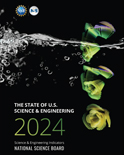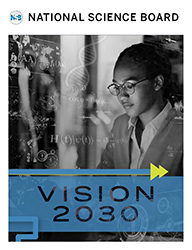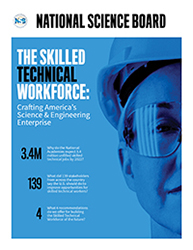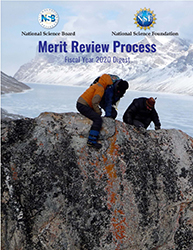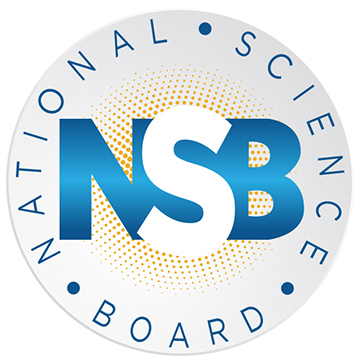
New leadership of the National Science Board
NSB elects University of Utah Presidential Professor of Computational Science Dan Reed as chair and re-elects University of the District of Columbia Vice President for Research Victor McCrary as vice chair
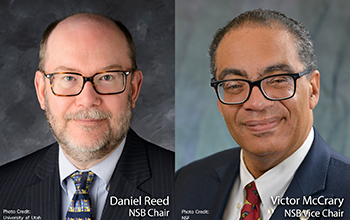
Dan Reed and Victor McCrary (Credit and Larger Version)
May 11, 2022
Effective today, Dan Reed and Victor McCrary will lead the National Science Board (NSB) for the next two years as its respective chair and vice chair. NSB is unique in the federal government: it is both the policymaking body of the National Science Foundation (NSF) and an independent advisor to Congress and the President on science and engineering policy.
Reed replaces Ellen Ochoa, former director of the Lyndon B. Johnson Space Center who chaired the Board the last two years and previously served as its vice chair. Ochoa’s six-year term on the Board ended on May 10. The Board re-elected McCrary to serve another two years as NSB’s vice chair.
“Continued advances in science and engineering have never been more important,” says Reed. “New insights and discoveries help us better understand the world and help fuel America’s economy. I look forward to working with NSF Director Panchanathan and his leadership team, the U.S. Congress, the Administration, our science and engineering colleagues, and industry leaders so that our country remains a keystone of global science and engineering.”
“I am honored to continue serving as vice chair and to work with our new chair to help advance the shared goals of the Board, the Director, Congress, and the President to expand science and technology opportunities and capacity across the United States, delivering research benefits to all Americans so that our nation continues to flourish,” says Victor McCrary.
About Dan Reed
Reed is a member of the NSB class of 2018-2024. Over the last two years, Reed chaired the Board’s Committee on Awards and Facilities, which provides oversight of and makes recommendations to the Board on NSF awards and facilities. Reed has also served on NSB’s Committee on Strategy – which provides strategic guidance on NSF’s budget and programs – and on the Committee for National Science and Engineering Policy, which guides production of NSB’s congressionally mandated Science & Engineering Indicators report.
Reed formerly served as Provost at the University of Utah where he now is Presidential Professor of Computational Science and Professor of Computer Science and Electrical & Computer Engineering. Reed previously was Professor of Computer Science, Electrical and Computer Engineering, and Medicine at the University of Iowa where he served as Vice President for Research and Economic Development. Previously, Reed helped shape Microsoft's long-term vision for technology innovations in cloud computing and the company's policy engagement with governments and institutions worldwide as the company’s Corporate Vice President for Technology Policy and Extreme Computing.
Among prior positions, Reed was the Founding Director of the Renaissance Computing Institute at the University of North Carolina at Chapel Hill, Gutgsell Professor and Head of the Department of Computer Science at the University of Illinois at Urbana-Champaign, and a principal investigator and chief architect for the NSF TeraGrid, which became NSF XSEDE.
Reed has served on the U.S. President’s Council of Advisors on Science and Technology, the President’s Information Technology Advisory Committee, the National Academies of Science (NAS) Board on Global Science and Technology, the International Telecommunications Union CTO Council, and the ICANN Generic Names Supporting Organization Council. He chairs the Department of Energy’s Advanced Scientific Computing Advisory Committee and the NAS Panel on Computational Sciences at the Army Research Laboratory. Reed is a Fellow of the Association for Computing Machinery, Institute of Electrical and Electronics Engineers, and American Association for the Advancement of Science.
About Victor McCrary
Last week, the Biden-Harris Administration re-appointed McCrary to serve a second six-year term on the NSB. During his first six years of service, McCrary championed for and led development of the Board’s report, The Skilled Technical Workforce: Crafting America’s Science and Engineering Enterprise, guided NSB’s Vannevar Bush and Public Service awards recommendations, and led NSB’s implementation of Vision 2030, including by engaging with a multitude of science and engineering communities.
McCrary currently serves as Vice President for Research and Professor of Chemistry at the University of the District of Columbia. Previously, he was Vice Chancellor for Research at the University of Tennessee, Knoxville and the first Vice President for Research and Economic Development and Professor of Chemistry at Morgan State University, Baltimore, MD. Prior to that, McCrary was the Business Area Executive for Science & Technology and principal professional staff at The Johns Hopkins University Applied Physics Laboratory where he directed internal research and development (IRAD) funding to develop new core competencies and innovations in the areas of national security and space technologies for civilian and military applications.
He started his career at AT&T Bell Laboratories-Murray Hill, as a post-doc and then Member of Technical Staff before being tapped to be a program manager with the Advanced Technology Program and becoming the first Chief of the Convergent Information Systems Division at the National Institute of Standards and Technology (NIST). At NIST, McCrary led the first efforts to develop industry standards for electronic books where he was a co-recipient of the US Department of Commerce’s Gold Medal for his efforts. He is a former national president of the National Organization for the Professional Advancement of Black Chemists and Chemical Engineers (NOBCChE) and a Fellow of the American Chemical Society.
About the National Science Board
The NSF consists of the National Science Board and NSF Director. Jointly, the Board and the Director pursue the goals and mission of the agency. The Board identifies issues critical to NSF's future and establishes the agency’s policies within the framework of applicable national policies. The Board also serves as an independent advisory body to Congress and the Administration on policy issues in science and engineering (S&E) and education in S&E. The President appoints NSB’s 24 members—selected for their S&E expertise in research and education—for a six-year term.
Media Contact Nadine Lymn, National Science Board, (703) 292-2490, nlymn@nsf.gov
Useful NSB Web Sites:
Home Page: http://www.nsf.gov/nsb
Media Contact: http://www.nsf.gov/staff/staff_bio.jsp?lan=nlymn&org=NSF
News: http://www.nsf.gov/nsb/news
Meetings: http://www.nsf.gov/nsb/meetings
Publications: http://www.nsf.gov/nsb/publications
Facebook: https://www.facebook.com/NationalScienceBoard
Twitter: Twitter: https://twitter.com/intent/user?screen_name=NSF_NSB
YouTube: https://www.youtube.com/channel/UCkrHRzuGSrPp2haQs0T_Pww
To view PDF documents, please download Adobe Acrobat Reader.
